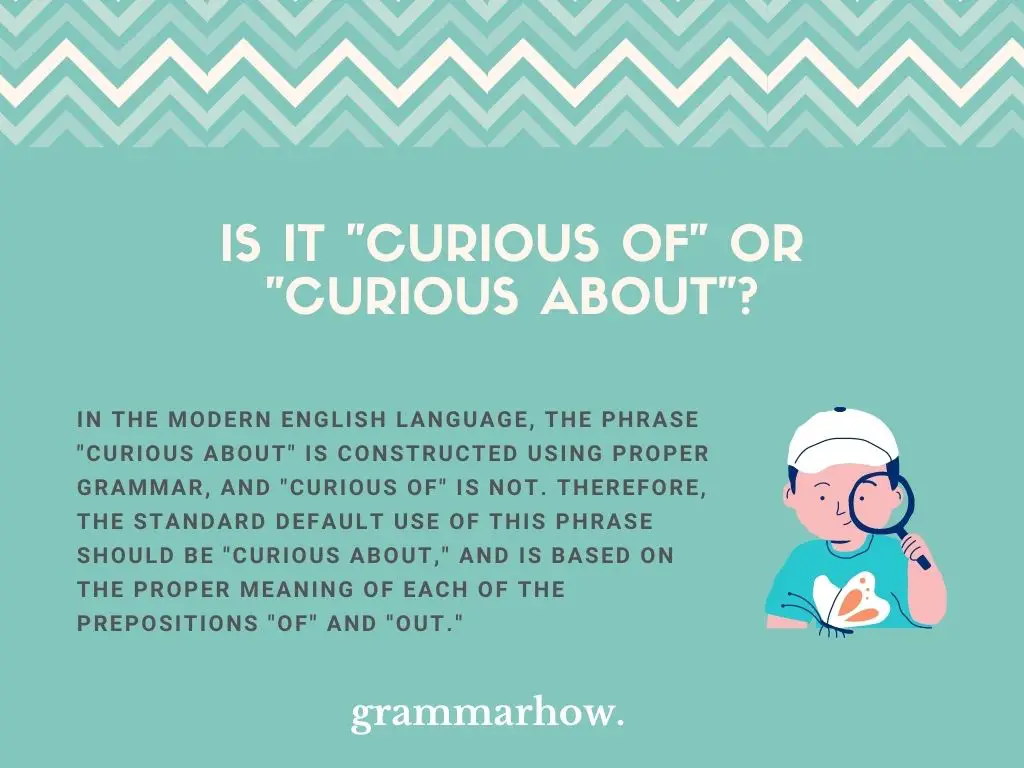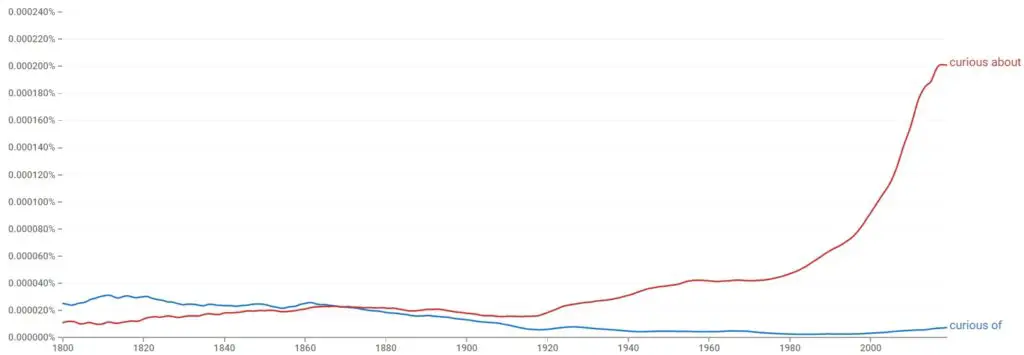It often can be difficult to determine the proper preposition to use after particular words. The phrases “curious of” and “curious about” are no exception and you may have heard instances of both variations in everyday language. Here you will learn the correct phrase to use and it’s meaning.
Is It “Curious Of” Or “Curious About”?
In the modern English Language, the phrase “curious about” is constructed using proper grammar, and “curious of” is not. Therefore, the standard default use of this phrase should be “curious about,” and is based on the proper meaning of each of the prepositions “of” and “out.”

The preposition “of” expresses a sort of relationship of a part of something to its whole (i.e, “most of the pie”). The preposition “about” is used when you are talking about the subject of something or concerning something (i.e., “I am worried about him”). Based on these two meanings, you can clearly see that “about” is the proper preposition to use in context with “curious.”
Is It Ever Correct To Use “Curious Of”?
When you look at the word “curious” in different English Language dictionaries, you can easily see that it is not common or standard to use the word “of” after it. This phrasing does not appear in any of several well-known dictionaries and should not be considered correct usage.
In The Cambridge Dictionary, you can find the word “curious” followed by “about,” “as,” “to,” and “that,” but no examples use it with the preposition “of.”
The same holds true if you look in the Oxford Learner’s Dictionary. The word “curious” is shown here with the same prepositions as The Cambridge Dictionary and also does not show the preposition “of” in an example.
Even a look at the Merriam-Webster Dictionary brings up the same results. It also shows the examples “curious about,” and “curious to,” but does not have any examples showing “curious of.”
Therefore, if you hear people use the phrase “curious of,” they are using it incorrectly or as a sort of informal vernacular.
How Prevalent Is The Use Of “Curious About” And “Curious Of”?
In modern English, there is no question that “curious about” is the much more prevalent phrase. However, earlier on in the English Language, you would find that “curious of,” and “curious about” were used at a similar rate. In the early 1800s, “curious of” was actually slightly more popular.
This Google Ngram Viewer shows the usage for the two phrases and one can easily see that in the late 1800s, the phrase “curious about” became more popular and its usage has risen ever since.

As of 2019, “curious about” was extremely more prevalent than “curious of,” to the point that “curious of” barely appears as a line on the graph. This trend indicates that “curious of” is not commonly accepted in the English Language.
Examples Of How To Use “Curious Of” And “Curious About” In A Sentence
When you look at examples of “curious of” and “curious about” used in a sentence, it is easy to see why “curious about” is the proper form to use. The reason for this is that the word “curious” is always used in relation to a subject or a topic.
See these examples which show the incorrect and correct usage.
- Incorrect Usage: She was curious of the people who lived in that particular area, so she spent some time living there to research it more.
- Correct Usage: She was curious about the people who lived in that particular area, so she spent some time living there to research it more.
- Incorrect Usage: Young children are very curious of the world around them and love to explore and learn about everything.
- Correct Usage: Young children are very curious about the world around them and love to explore and learn about everything.
- Incorrect Usage: I was just talking of you and then you showed up.
- Correct Usage: I was just talking about you and then you showed up.
See how in each of these examples, the word “curious” refers to a particular subject or topic (the people who lived there, the world around them, you) and not part of something as a whole, which makes “about” the proper preposition to use.
Can “Curious” Be Used With Other Prepositions?
There are other prepositions you can use correctly with the word “curious.” They include the prepositions “as,” “to,” and “that.” The definitions of these prepositions make sense when following the word “curious.”
Curious As
The preposition “as” indicates a comparison when used with the word “curious.” See these examples for further clarification.
- I’m as curious as she is as to how the window got broken.
- People often tell me that I’m as curious as a cat.
- We were as curious as can be, about the rest of the story.
Curious To
When used after the word “curious” the preposition “to,” acts similarly to “about” in that it refers to the subject of something or concerning something. See these examples for some context.
- I’m curious to see what will happen at the end of the movie because everyone said it was surprising.
- I’d be curious to see what she chose to go to that school, as it doesn’t seem like the best fit for her interests.
- The actors were all curious to see how the audience responded to the new play.
Curious That
The preposition “that” can also be used to refer to a specific thing or identify a subject, which is why it can correctly be used after the word that. These sentences help to show this relationship.
- I find it curious that we never get a direct answer from him no matter how many times we ask.
- Does anyone else find it curious that showed up late for the meeting even though he was the one who scheduled it?
- It seems curious that the politician is making that decision when everyone around him seems to think it is the wrong one to make.

Martin holds a Master’s degree in Finance and International Business. He has six years of experience in professional communication with clients, executives, and colleagues. Furthermore, he has teaching experience from Aarhus University. Martin has been featured as an expert in communication and teaching on Forbes and Shopify. Read more about Martin here.
